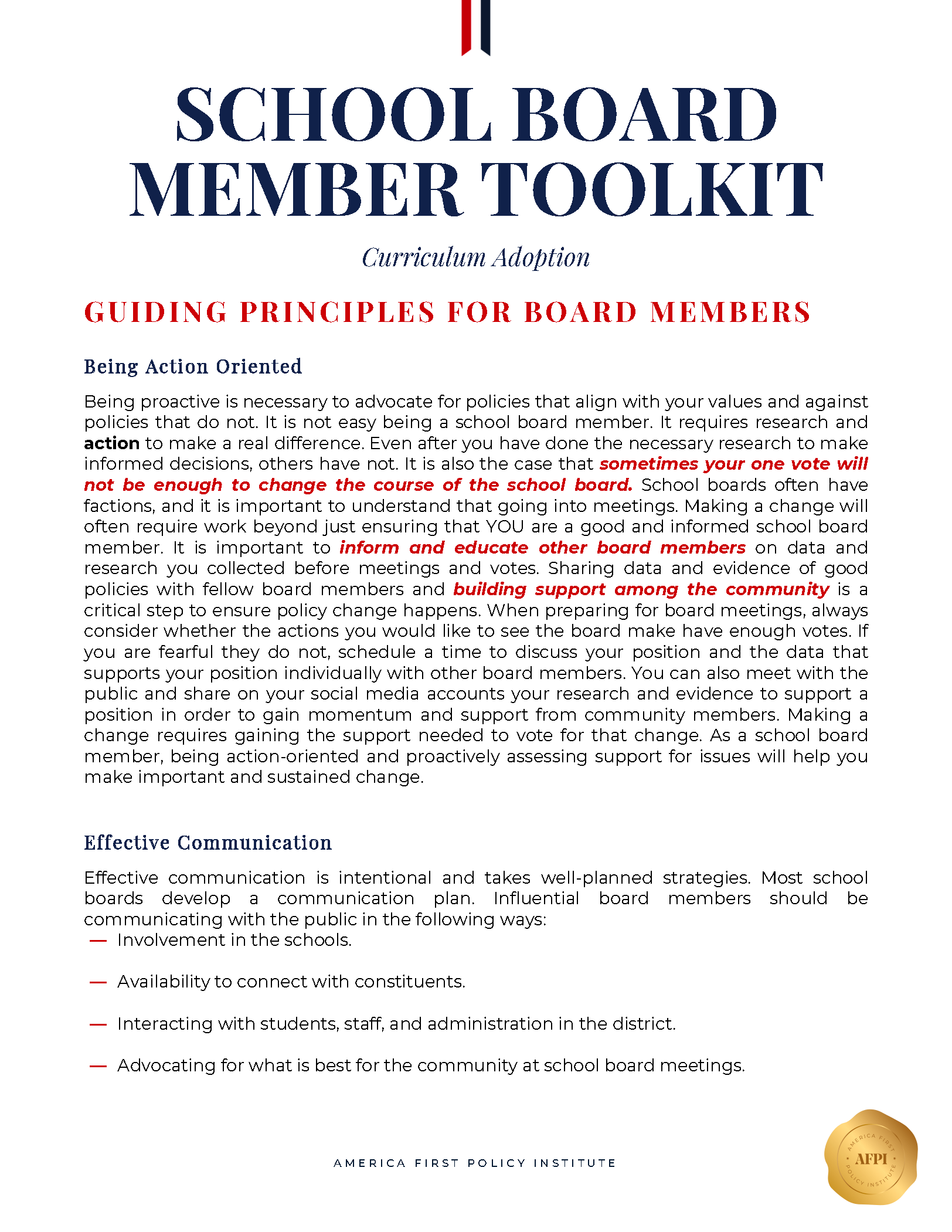School Board Member Toolkit - Curriculum Adoption: Guiding Principles for Board Memebers
Being Action Oriented
Being proactive is necessary to advocate for policies that align with your values and against policies that do not. It is not easy being a school board member. It requires research and action to make a real difference. Even after you have done the necessary research to make informed decisions, others have not. It is also the case that sometimes your one vote will not be enough to change the course of the school board. School boards often have factions, and it is important to understand that going into meetings. Making a change will often require work beyond just ensuring that YOU are a good and informed school board member. It is important to inform and educate other board members on data and research you collected before meetings and votes. Sharing data and evidence of good policies with fellow board members and building support among the community is a critical step to ensure policy change happens. When preparing for board meetings, always consider whether the actions you would like to see the board make have enough votes. If you are fearful they do not, schedule a time to discuss your position and the data that supports your position individually with other board members. You can also meet with the public and share on your social media accounts your research and evidence to support a position in order to gain momentum and support from community members. Making a change requires gaining the support needed to vote for that change. As a school board member, being action-oriented and proactively assessing support for issues will help you make important and sustained change.
Effective Communication
Effective communication is intentional and takes well-planned strategies. Most school boards develop a communication plan. Influential board members should be communicating with the public in the following ways:
- Involvement in the schools.
- Availability to connect with constituents.
- Interacting with students, staff, and administration in the district.
- Advocating for what is best for the community at school board meetings.
Open communication builds a strong foundation of trust and enables school board members to engage positively with the public and advocate for their values. Maintaining constructive strategies of communication is essential. Board members can solicit community input through the following:
— Participate in Open Forums
- Forums can be educational and informative. One idea is to solicit questions on notecards to avoid long questions that take up time.
— Keep Regular Board Office Hours
- Regular open-door meetings build trust. Constructive dialogue can happen during office hours, and sometimes issues can be solved before they even come up.
— Create Study Groups and Committees
- Study groups and committees are usually task-focused and can be a great means of communication between parents and school board members.
— Develop and Distribute Surveys
- Surveys are a great way of obtaining information about any given topic within the community. These are cost-effective and can easily be shared on the webpage and social media pages.
— Social Media
- Social media is helpful for school board members to help clarify any information, proactively update parents, and remain transparent and accountable to the public.
Respecting the community’s role in the system is essential to help create the best learning environment possible for students and families.
Accountability to the School Board District Community
Accountability is key to seeing policies through. School board members must be able to back up their decisions and actions with facts and data. The board’s actions must be transparent and accountable to the public. A high-achieving school board should focus on prioritizing and improving student achievement. School board members should engage in ongoing, two-way conversations with the community. Effective community engagement is essential to create trust and support among the community, board, superintendent, and staff.
Use Data to Make Informed Decisions
A good school board will use relevant data in decision-making processes. It is important to obtain all data related to student outcomes, school rankings, achievement, and professional development and training needs of teachers. Board members need to utilize this data in decision-making and in explanations to the community.
Prioritizing the Needs of the Students
Many issues affect a board’s goals and topics of discussion. It is important never to lose sight of the main priority—the students. There are no one-size-fits-all solutions, but an effective school board member should make decisions regarding school practices and curriculum with the benefit of the students in mind at all times.
More Resources
July 06, 2023
AFPI Leads the Charge in Most Historic Year for School Choice Progress
At the America First Policy Institute (AFPI), we believe that the transformative progress on school choice will help prepare Americans for the rights and responsibilities of citizenship.
April 04, 2023
FACT SHEET: Colorado HB23-1003 Gives Parents Less Control Over Their Child’s Education
“I do not believe in co-parenting with the government, and I never will. Parental rights are a God-given blessing. I am deeply saddened to see our country even debating who should…
March 24, 2023
